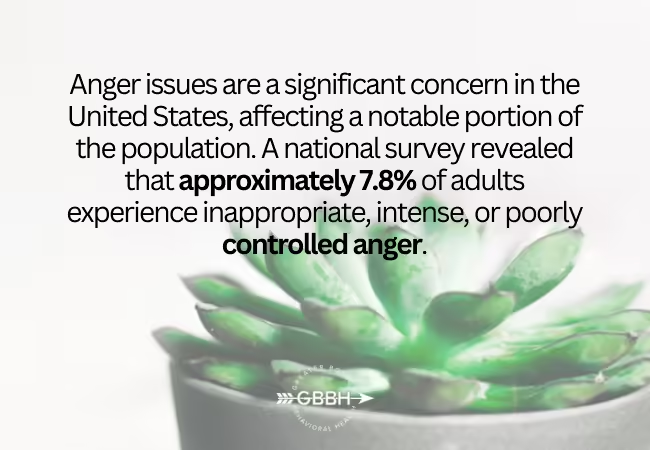Anger is a natural emotional response to perceived threats, injustice, or frustration. While it can be healthy and constructive when expressed appropriately, anger that is frequent, intense, or poorly managed can disrupt personal relationships, professional success, and overall well-being. Addressing anger issues through structured techniques and therapies is essential for fostering emotional balance and healthier interactions.
At Greater Boston Behavioral Health, we offer specialized Anger Management Therapy as part of our comprehensive Mental Health Treatment Programs, utilizing evidence-based approaches like CBT Therapy and DBT Therapy to help individuals regain control over their emotions and improve their quality of life.
What Are Anger Issues?
Anger issues occur when individuals struggle to regulate or express their anger in constructive ways. Anger can manifest in different forms, including:
- Explosive Anger: Intense outbursts that may include yelling, physical aggression, or verbal abuse.
- Passive-Aggressive Behavior: Indirect expressions of anger, such as sarcasm, ignoring others, or intentionally delaying tasks.
- Suppressed Anger: Bottling up feelings, which can lead to resentment, depression, or physical symptoms.
These issues often stem from underlying factors such as unresolved trauma, chronic stress, mental health disorders, or poor emotional regulation skills.
Causes of Anger Issues
Anger issues often stem from a combination of external triggers, internal struggles, and past experiences. Understanding the underlying causes is essential for addressing and managing anger effectively.
1. Stress and External Triggers
- Work-Related Stress: Deadlines, conflicts with colleagues, or job dissatisfaction can lead to frustration and irritability.
- Relationship Struggles: Miscommunication, unmet expectations, or unresolved conflicts in personal relationships can fuel anger.
- Everyday Challenges: Traffic jams, long lines, or other daily inconveniences may provoke outbursts when compounded with stress.
2. Mental Health Conditions
- Anxiety and Depression: Individuals with anxiety or depression may experience heightened irritability or frustration.
- PTSD: Past trauma can lead to emotional reactivity and difficulty managing anger.
- Bipolar Disorder: Sudden mood shifts in bipolar disorder can include episodes of intense anger.
3. Past Trauma or Emotional Pain
- Unresolved Childhood Issues: Adverse Childhood Experiences (ACEs) can create deep emotional wounds that manifest as anger in adulthood.
- Learned Behaviors: Growing up in environments where anger was expressed aggressively can normalize unhealthy coping mechanisms.
4. Biological Factors
- Hormonal Imbalances: Changes in hormones, such as during puberty or menopause, can affect mood and emotional control.
- Neurological Factors: Overactivation of the brain’s stress response system can make anger responses more frequent and intense.
The Impact of Uncontrolled Anger
Uncontrolled anger can have far-reaching consequences in various aspects of life:
1. Emotional and Mental Health
- Increased Anxiety and Depression: Frequent anger can heighten stress levels and contribute to feelings of guilt, sadness, or hopelessness.
- Chronic Irritability: Difficulty letting go of minor irritations can create a constant state of tension.
2. Relationships
- Strained Personal Relationships: Unchecked anger can lead to conflicts, misunderstandings, and emotional distancing in friendships, romantic relationships, and family dynamics.
- Impact on Parenting: Children exposed to frequent anger may develop fear, anxiety, or difficulty regulating their own emotions.
3. Professional Life
- Workplace Challenges: Difficulty managing anger in professional settings can damage reputations, hinder career growth, and create a toxic work environment.
- Decreased Productivity: Anger can impair focus and decision-making, reducing efficiency.
4. Physical Health
- Cardiovascular Risks: Chronic anger has been linked to hypertension, heart disease, and stroke.
- Weakened Immune System: Prolonged stress from anger affects the body’s ability to fight infections.
- Sleep Disturbances: Anger can disrupt sleep patterns, further exacerbating physical and mental health challenges.
Effective Anger Management Techniques
Anger management involves learning to recognize triggers, regulate emotional responses, and develop constructive ways to express feelings. At Greater Boston Behavioral Health, we integrate the following evidence-based techniques into our therapy programs:
1. Cognitive Behavioral Therapy (CBT)
CBT is a widely used, evidence-based approach that focuses on identifying and changing negative thought patterns that fuel anger. It includes:
- Trigger Identification: Understanding specific situations or thoughts that provoke anger.
- Cognitive Restructuring: Reframing irrational or exaggerated thoughts into balanced, constructive ones.
- Behavioral Interventions: Developing healthier responses to anger-provoking situations, such as taking a timeout or practicing assertive communication.
2. Dialectical Behavior Therapy (DBT)
DBT is particularly effective for individuals who struggle with intense emotional reactions. Its focus on emotional regulation and mindfulness makes it a powerful tool for managing anger. Key techniques include:
- Mindfulness Exercises: Increasing awareness of emotions without acting on them impulsively.
- Distress Tolerance Skills: Learning to manage intense anger through relaxation techniques, grounding exercises, and self-soothing strategies.
- Interpersonal Effectiveness: Teaching clients how to assertively express their needs without aggression.
3. Relaxation Techniques
Relaxation strategies help lower physiological arousal and create a sense of calm. Examples include:
- Deep Breathing Exercises: Focusing on slow, controlled breaths to reduce heart rate and tension.
- Progressive Muscle Relaxation: Alternating tension and relaxation in muscle groups to release physical stress.
- Meditation and Yoga: Promoting self-awareness and emotional balance.
4. Assertive Communication Training
Anger often stems from unmet needs or unexpressed feelings. Learning to communicate assertively rather than aggressively can:
- Prevent misunderstandings.
- Foster healthier relationships.
- Promote mutual respect.
5. Journaling
Writing about anger triggers and emotional responses provides insight into patterns and progress over time. Journaling can also serve as an outlet for pent-up emotions.
The Role of Professional Therapy in Anger Management
While self-help techniques are valuable, professional therapy is often necessary to address deeper issues and develop long-lasting solutions. Anger Management Therapy at Greater Boston Behavioral Health provides:
- Personalized Care Plans: Tailored strategies to address individual triggers and challenges.
- Trauma-Informed Approaches: Addressing past experiences that may contribute to chronic anger.
- Supportive Environment: A safe space to explore emotions without judgment.
Role of Professional Anger Management Therapy
Professional therapy provides the tools and guidance needed to manage anger effectively and address its underlying causes. At Boston Behavioral Health, our Anger Management Programs offer personalized, evidence-based care to help clients regain control over their emotions.
1. Comprehensive Assessment
Therapists evaluate the triggers, patterns, and underlying causes of anger to create a tailored treatment plan. This assessment includes identifying co-occurring mental health conditions, such as anxiety or trauma, that may contribute to anger issues.
2. Evidence-Based Therapeutic Approaches
- Cognitive Behavioral Therapy (CBT): Helps clients recognize and challenge negative thought patterns that fuel anger. Techniques include reframing thoughts, problem-solving skills, and assertiveness training.
- Dialectical Behavior Therapy (DBT): Focuses on emotional regulation, mindfulness, and distress tolerance, equipping clients with strategies to manage intense emotions.
- Trauma-Informed Care: Addresses unresolved trauma that may be at the root of chronic anger, creating a safe and supportive environment for healing.
3. Emotional Regulation and Communication Skills
Therapy helps individuals develop healthier ways to express anger, such as:
- Communicating needs assertively rather than aggressively.
- Recognizing and de-escalating anger before it intensifies.
4. Long-Term Support
Professional therapy provides ongoing tools and strategies to help clients manage anger in the long term, improving relationships, work performance, and overall quality of life.
Tips for Managing Anger in Daily Life
In addition to professional therapy, incorporating daily practices can help individuals manage anger and prevent it from escalating.
1. Recognize Early Warning Signs
- Pay attention to physical cues such as a racing heart, clenched fists, or jaw tension.
- Identify common triggers and prepare strategies to address them calmly.
2. Practice Deep Breathing
- Take slow, deep breaths to reduce tension and lower your heart rate.
- Example: Inhale for a count of four, hold for four, and exhale for four.
3. Use Mindfulness Techniques
- Focus on the present moment to reduce overthinking or dwelling on frustrations.
- Incorporate meditation or grounding exercises into your routine.
4. Channel Anger into Physical Activity
- Exercise, such as jogging, yoga, or weightlifting, can help release built-up tension and boost mood.
5. Communicate Effectively
- Use “I” statements to express feelings without blaming others (e.g., “I feel upset when…”).
- Practice active listening to avoid misunderstandings.
6. Create a Relaxation Routine
- Dedicate time each day to activities that bring joy and relaxation, such as reading, hobbies, or spending time in nature.
7. Seek Social Support
- Talk to trusted friends or family members about your feelings to gain perspective and emotional validation.
Breaking the Cycle of Anger
Breaking the cycle of chronic anger requires self-awareness, a commitment to change, and support from professionals and loved ones. Here’s how:
1. Identify Patterns
- Reflect on recurring triggers and reactions.
- Use journaling to track situations where anger arises and evaluate how it was managed.
2. Reframe Negative Thought Patterns
- Challenge automatic thoughts that escalate anger, such as assumptions or exaggerations.
- Replace negative thoughts with balanced and constructive ones (e.g., “This situation is frustrating, but I can handle it calmly.”).
3. Build Emotional Resilience
- Develop healthier coping mechanisms, such as relaxation techniques, to handle stress and setbacks more effectively.
- Strengthen emotional regulation skills through CBT Therapy or DBT Therapy.
4. Foster Healthy Relationships
- Repair and strengthen relationships by practicing empathy, forgiveness, and open communication.
- Set boundaries to prevent recurring conflicts.
5. Commit to Growth
- Recognize that managing anger is an ongoing process. Celebrate progress, even small steps, and remain patient with yourself.
- Engage in professional therapy to address deeper issues and receive personalized support.
The Role of Behavioral Health in Boston
Anger is often intertwined with broader mental health challenges like anxiety, depression, or trauma. At Greater Boston Behavioral Health, our Mental Health Treatment Programs are designed to provide holistic care that addresses the root causes of anger. Our programs include:
- CBT and DBT Therapy Integration: Combining therapies to improve emotional regulation, communication, and problem-solving skills.
- Trauma-Informed Care: Ensuring a safe and empowering environment for healing.
- Individual and Group Therapy Options: Flexible formats to meet diverse needs.
Conclusion
Anger, when unmanaged, can become a barrier to personal growth and healthy relationships. However, with the right tools and support, it is possible to transform anger into a constructive force. At Greater Boston Behavioral Health, we are committed to helping individuals regain control over their emotions and build fulfilling, harmonious lives.
If anger is affecting your life, don’t wait to seek help. Contact our Mental Health Treatment Center in Boston today to learn more about our Anger Management Therapy and start your journey toward emotional balance and resilience. Call us at (888)278-0716 today to learn more about our services and how we can help you on your journey to recovery!
FAQ on Anger Issues and Effective Anger Management
What are the common causes of anger issues?
Anger issues often stem from chronic stress, unresolved trauma, mental health conditions like anxiety or depression, and learned behaviors from childhood experiences.
How do anger issues affect mental health?
Unmanaged anger can worsen mental health conditions such as anxiety, depression, and PTSD, while also leading to emotional dysregulation and strained relationships.
What is Anger Management Therapy?
Anger Management Therapy is a structured approach to help individuals recognize triggers, develop healthier coping mechanisms, and express anger constructively through evidence-based techniques like CBT and DBT.
How does CBT help with anger management?
Cognitive Behavioral Therapy helps individuals identify and reframe negative thought patterns, recognize triggers, and develop healthier responses to anger-provoking situations.
Can DBT help with anger management?
Yes, Dialectical Behavior Therapy focuses on emotional regulation, mindfulness, and distress tolerance, making it highly effective for managing intense anger.
What are some daily tips for managing anger?
Daily tips include practicing deep breathing, engaging in physical activity, journaling, using “I” statements for communication, and recognizing early warning signs of anger.


